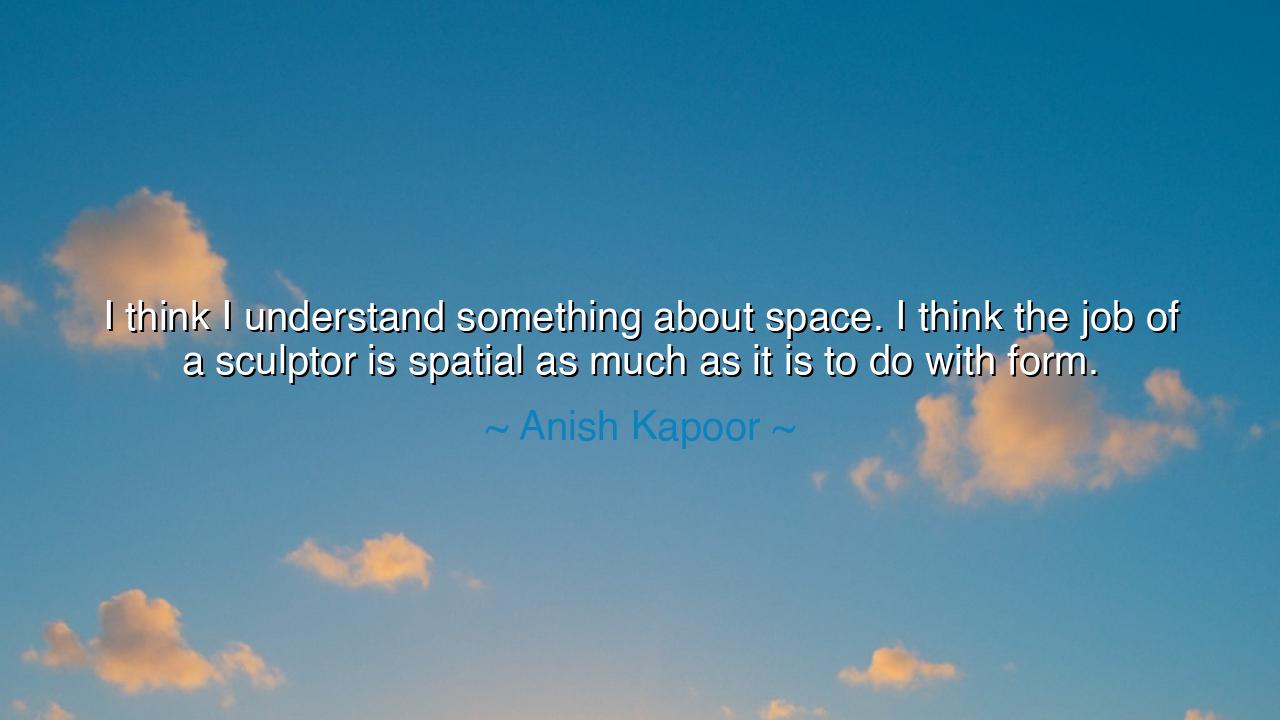
I think I understand something about space. I think the job of a
I think I understand something about space. I think the job of a sculptor is spatial as much as it is to do with form.






Hear the voice of Anish Kapoor, master of void and mirror, who speaks with the wisdom of an artist that has touched the eternal: “I think I understand something about space. I think the job of a sculptor is spatial as much as it is to do with form.” These words open the mind to an ancient truth: art is not merely the shaping of matter, but the commanding of the infinite. The sculptor does not only carve stone or mold clay; he calls upon the unseen, the empty, the vastness around the object. In doing so, he teaches us that life itself is shaped not only by what is present, but by what is absent, by the space that surrounds all things.
The form is the vessel, but space is the mystery. A statue rises from marble, yet what gives it breath is the air around it, the silence it commands, the shadow it casts. So too in life: our deeds are forms, but their meaning is revealed in the spaces between them—the pauses, the silences, the contexts in which they live. Kapoor, like the ancients, reminds us that the void is not nothingness; it is presence unseen, a womb of possibility. The sculptor is both builder and revealer, not only of shape, but of the universe that surrounds the shape.
History whispers this same truth through the works of the ancients. Think of the great temple at Delphi in Greece. The columns are form, the stone is form, but what awed the pilgrim was the space within—the hollow that beckoned the spirit, the emptiness that spoke louder than stone. In Gothic cathedrals, the soaring arches do not merely display form; they command space, pulling the eye heavenward, lifting the heart into prayer. The builders knew what Kapoor proclaims: the sacred lies as much in what is carved as in what is left uncarved, as much in the seen as in the unseen.
Consider Michelangelo, whose David stands in glory. The body of David is form, yes, but what magnifies it is the space around him—the breath of the gallery, the distance that makes his gaze overwhelming, the emptiness that sets him apart from ordinary men. Michelangelo himself declared that he did not create forms but released them from stone, revealing what the space within the marble already contained. His genius was not only in shaping matter, but in awakening the invisible presence within it.
The words of Kapoor are not limited to sculpture; they are a teaching for the whole of existence. For in our lives, too, we must learn to honor both form and space. Our actions are forms—the things we do, the words we speak, the works we build. But our silences, our stillness, our pauses are spaces—and they too hold power. In conversation, silence gives weight to speech. In music, the pause gives beauty to the note. In living, the moments of stillness give meaning to the rush of activity.
The lesson is clear: do not fill every void. Do not fear space, for it is as sacred as form. When you work, leave room for breath; when you love, leave room for freedom; when you create, let the empty be as meaningful as the filled. For it is in the hollow of the vessel that water is held, and it is in the silence of the heart that wisdom is heard.
Practical actions flow from this wisdom. Create not only by doing, but by allowing. When you speak, honor pauses. When you design, honor emptiness. When you live, carve form but also embrace space. In the balance of these two lies harmony, beauty, and truth. For as Kapoor teaches, the true work of the sculptor—and of every soul—is not only to shape matter, but to command the unseen, to dwell within the infinite, and to make of space itself a living work of art.
Thus, let Kapoor’s words be passed down: the sculptor’s task is not merely to mold stone but to awaken the invisible; not only to carve form, but to give life to space. In this truth lies not only the secret of art, but the secret of existence itself.






AAdministratorAdministrator
Welcome, honored guests. Please leave a comment, we will respond soon